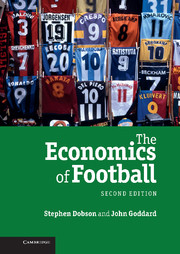Book contents
- Frontmatter
- Contents
- Preface
- Acknowledgements
- List of figures
- List of tables
- 1 Introduction
- 2 The economic theory of professional sports leagues
- 3 Competitive balance, uncertainty of outcome and home-field advantage
- 4 Forecasting models for football match results
- 5 Game theory and football games
- 6 English professional football: historical development and commercial structure
- 7 Determinants of professional footballers' salaries
- 8 Professional footballers: employment patterns and racial discrimination
- 9 The football manager
- 10 The football referee
- 11 Spectator demand for football
- 12 Gambling on football
- 13 Football around the world: France, Germany, Brazil, Japan and China
- 14 The economics of the World Cup
- References
- Index
5 - Game theory and football games
Published online by Cambridge University Press: 05 June 2012
- Frontmatter
- Contents
- Preface
- Acknowledgements
- List of figures
- List of tables
- 1 Introduction
- 2 The economic theory of professional sports leagues
- 3 Competitive balance, uncertainty of outcome and home-field advantage
- 4 Forecasting models for football match results
- 5 Game theory and football games
- 6 English professional football: historical development and commercial structure
- 7 Determinants of professional footballers' salaries
- 8 Professional footballers: employment patterns and racial discrimination
- 9 The football manager
- 10 The football referee
- 11 Spectator demand for football
- 12 Gambling on football
- 13 Football around the world: France, Germany, Brazil, Japan and China
- 14 The economics of the World Cup
- References
- Index
Summary
Introduction
Game theory is the study, by mathematicians, economists and decision scientists, of decision-making in situations of conflict and interdependence. Most games played in real life are complex, with multiple strategies, incomplete information and pay-offs that might not be explicitly specified. By contrast, sports sometimes give rise to situations in which the structure of a ‘game’ (using the term in the technical sense) is simple and clearly defined. Accordingly, some economists have argued that sports such as football, and others, offer a highly promising arena for the empirical investigation of the propositions of game theory.
In football, the ‘game’ between the kicker and the goalkeeper that is played out each time a penalty kick is awarded and taken approximates rather closely to the simple and highly stylised examples typically used to develop the principles of game theory in economics textbooks. The kicker must decide in which direction to shoot and the goalkeeper must decide in which direction to dive. Each decides simultaneously, before knowing the other's selection. The reward structure is zero-sum: either the kicker scores; or a goal is prevented because the goalkeeper saves or the kicker shoots high or wide. Section 5.1 of this chapter examines theoretical and empirical research on the strategic choices of kickers and goalkeepers during those few intense and highly charged moments that elapse between the referee's decision to award a penalty, and its execution.
- Type
- Chapter
- Information
- The Economics of Football , pp. 106 - 138Publisher: Cambridge University PressPrint publication year: 2011



